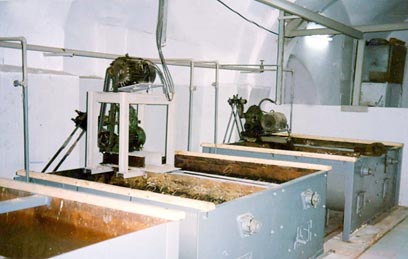_a.jpg)
Alul Factory Manager, Ragheb Alul
צילום: שחרורי
Nablus tahini with kosher seal?
Palestinian factory applying for kashrut certificate from Chief Rabbinate in order to market products in Israel
Nablus-made tahini has always been well known, but now it may receive wider exposure. The Chief Rabbinate's kashrut department said it recently received a request from the Alul Factory in Nablus, which manufactures tahini and halva (sweetmeat of sesame oil and nuts), to receive a kosher seal on their products.
The Chief Rabbinate said it was the first time a Palestinian business applied for such a certificate, and that despite the complexity of the matter, they are likely to approve the request.
The unusual request was made after Israeli businesses and marketing chains refused to buy the factory's tahini and because one of the chains had turned kosher and was forced to remove the Nablus product from it shelves.
_wa.jpg)
Alul Company manager Ragheb Alul told Ynet: "During the 1980s we did have a kashrut certificate, but it was taken away once Nablus was transferred to the Palestinian Authority. Before that we had provided tahini to many factories in Israel. Since, our workload has dropped considerably.
"We've now applied for a new kashrut certificate, but the rabbis have strict terms such as not working on Saturdays and insisting that the ovens be turned on by a kashrut supervisor. We've also been asked to pay some NIS 20,000 ($5,651) a year."

The Peres Center for Peace said many solutions have been suggested in order to solve the supervising issue, one of which was to install security cameras at the factory. The Center promised to monitor the process, including helping the rabbis get an IDF approval to enter Palestinian territories.
The Chief Rabbinate said that the factory manager stressed he was aware of all of the problems having to do with the fact that his business is located in an area which is off limits to Israelis.
What about surprise inspections?
According to the law forbidding kashrut fraud, supervising certificates are issued by the local rabbinate in each community. In areas where such a rabbinate does not exist, such as Arab communities, the national kashrut rabbinate is responsible. Therefore, the factory's request will be discussed by the Chief Rabbinate.
Rabbi Jilber Cohen, Director-General of the Netanya Rabbinate, told Ynet there is basically no impediment to approving the request, but that there is a problem in ensuring that the supervisors do their work thoroughly, while maintaining their safety.
According to Cohen, the Palestinians have agreed to coordinate the rabbis' every entrance and exit with security forces and to provide them with protection. However, the rabbinate is concerned that this move will only hinder the kashrut standard, because it will not allow for surprise inspections.
The Chief Rabbinate said a product such as tahini is very simple to inspect, but that it fears setting a precedence which will require them to give kashrut certificates to other Palestinian factories where the task may not be so straightforward .
A decision is expected to be made within a few days, followed by another discussion at the Chief Rabbinate's kashrut department.
Hassan Shaalan contributed to this report.
- Follow Ynetnews on Facebook










